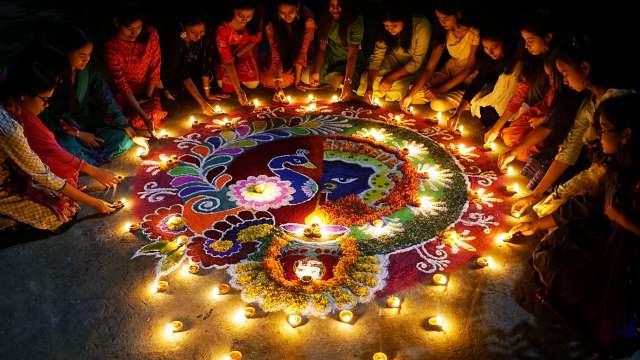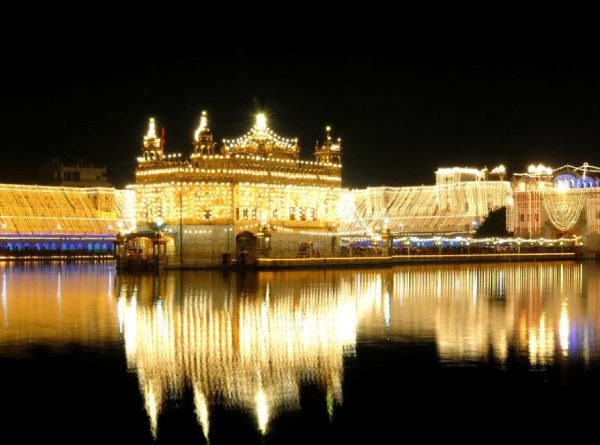
Diwali is a significant festival in India, symbolizing the victory of good over evil. It is celebrated over five days by lighting diyas and candles, decorating homes with rangolis, exchanging gifts, and setting off fireworks. Families and friends come together to enjoy festive meals, participate in traditional rituals and prayers, and express gratitude for blessings. The festival creates an electric atmosphere with twinkling lights and colorful decorations. It is a time to celebrate the triumph of light over darkness and express gratitude for the abundance in life.
History and Origins of Diwali
Diwali celebrates the triumph of good over evil, light over darkness, and knowledge over ignorance, and its origins can be traced back to ancient India. It is associated with the Hindu goddess Lakshmi and is celebrated in Jainism and Sikhism. It is a multi-day festival, with each day’s significance, from Dhanteras to Bhai Dooj. People light diyas, exchange gifts, and sweets, and express gratitude for their blessings.
The religious significance of Diwali
Diwali holds immense religious significance for Hindus, Jains, and Sikhs. For Hindus, the festival celebrates Lord Rama’s return to Ayodhya and the victory of good over evil. Lighting diyas during the festival symbolizes the triumph of light over darkness and knowledge over ignorance.
This festival is celebrated in Jainism as the day Lord Mahavir attained enlightenment, and it is a time to reflect on one’s spiritual journey and seek to achieve enlightenment. In Sikhism, the festival is celebrated as Bandi Chhor Divas, commemorating Guru Hargobind’s release and 52 other princes from prison.
Also, the Festival of Lights is a time for families and communities to come together, share meals, exchange gifts and sweets, and express gratitude for their blessings. The festival emphasizes the values of compassion, generosity, and harmony, and it is an important occasion for spiritual renewal and cultural celebration.

Traditions and Customs of Diwali
Diwali is a festival of lights widely celebrated throughout India and other parts of the world. The festival is associated with a range of traditions and customs that vary from region to region, but some standard practices include:
- Lighting diyas and candles to illuminate homes, streets, and public spaces.
- Decorating homes with rangoli patterns, flowers, and colorful lights.
- Preparing special meals and sweets, such as laddoos, barfis, and gulab jamuns.
- Exchanging gifts and sweets with family, friends, and neighbors.
- Buying and wearing new clothes.
- Performing puja rituals and offering prayers to Lord Ganesha and Goddess Lakshmi for wealth, prosperity, and happiness.
- Bursting firecrackers and lighting sparklers, though this tradition, is increasingly discouraged due to safety and environmental concerns.
- Donating to charity and helping those in need is a way of spreading goodwill and compassion.
The traditions and customs of the festival reflect the festival’s emphasis on light, prosperity, and harmony.
Diwali Celebrations Across India
Travelers visiting India during Diwali can witness the festival’s grand celebrations in different parts of the country. In northern India, particularly in Delhi and Varanasi, tourists can see the fantastic fireworks display and visit famous temples like the Kashi Vishwanath Temple. In western India, Mumbai celebrates it with colorful processions and street fairs, while in Gujarat, tourists can experience the grand Garba dance festival. In southern India, particularly in Tamil Nadu and Kerala, tourists can witness the Kolam art and light up their homes with oil lamps. Overall, during celebrations across India offer a unique cultural experience worth exploring. In East India, Diwali is celebrated as Kali Puja, where Goddess Kali is worshipped. People light diyas and decorate their homes with flowers and rangolis. Sweets such as rasgulla and Sandesh are prepared, and people visit friends and family to exchange gifts.

Travel during Diwali
Traveling to India during Diwali is an excellent way to immerse yourself in the country’s vibrant culture and traditions. If you plan to visit during this time, here are some tips to help you make the most of your visit.
- Experience the festivities: Attend various cultural events and witness grand fireworks displays during the festival of lights.
- Explore the local cuisine: Taste the traditional sweets and savory dishes prepared during Diwali, a time for feasting.
- Dress appropriately: Respect local customs and traditions by dressing modestly and avoiding revealing clothing, especially when visiting religious places.
- Connect with locals: Learn more about their customs and traditions by connecting with them during this time for family and friends to come together.
Tourists can celebrate Diwali during their visit to India in many ways. Here are some suggestions:
- Light diyas: Diyas (lamps) lighting is essential to Diwali celebrations. Tourists can purchase or make their diyas and light them outside their accommodations or public areas to experience the festival’s spirit.
- Attend cultural events: Many cities in India host cultural events during Diwali, including dance performances, music shows, and street fairs. Tourists can attend these events to witness the local culture and enjoy the festive vibe.
- Visit temples: Many temples in India have special rituals and celebrations during Diwali. Tourists can visit these temples to witness the traditional practices and offer prayers.
- Try traditional sweets and food: Diwali is a time for feasting, and tourists can try out the various conventional sweets and savory dishes prepared during this time. Many local markets and street vendors offer these delicacies.
- Shop for souvenirs: Diwali is also an excellent time, as many stores offer special discounts and promotions during the festival. Tourists can shop for traditional clothes, jewelry, and other souvenirs.
- Participate in fireworks: Fireworks are a big part of Diwali celebrations. Tourists can join in the fun by purchasing fireworks and lighting them in designated areas.
Tourists visiting India can celebrate Diwali by participating in various festival activities. Respecting local customs and traditions while enjoying the festive atmosphere is essential.
Best places to celebrate Diwali in India
India is a diverse country, and each region celebrates Diwali. Here are some of the best places in India to celebrate Diwali:
- Jaipur: During Diwali, the pink city of Jaipur comes alive with stunning illuminated palaces, fireworks, and cultural events.
- Varanasi: Varanasi is considered one of the holiest cities in India and is known for its magnificent aarti ceremony during Diwali. The city is beautifully decorated with diyas and lights, creating a mesmerizing atmosphere.
- Amritsar: The Golden Temple in Amritsar is beautifully lit up during Diwali, and the city is known for its grand celebrations, including fireworks and cultural events.
- Kolkata: Kolkata is known for its grand Kali Puja celebrations during Diwali, a unique blend of Hindu and Bengali traditions. The streets of Kolkata come alive with colorful lights and decorations during the festival.
- Mumbai: Mumbai’s iconic Marine Drive and the Gateway of India are lit up during Diwali, and the city is known for its grand processions, cultural events, and parties.
- Udaipur: Udaipur’s City Palace is illuminated with thousands of lights during Diwali, and the city hosts a grand cultural festival with music, dance, and fireworks.
- Delhi: The capital city of Delhi is famous for its grand Diwali celebrations, including fireworks, cultural events, and delicious food.

Must-try Diwali foods and sweets
Diwali, the festival of lights, is also a festival of feasting, and many traditional foods and sweets are a must-try during this time. Here are some fantastic Diwali foods and sweets that tourists may be interested in:
- Ladoo: Ladoo is a popular sweet made from flour, sugar, and ghee (clarified butter). It has many varieties, including besan laddoo, motichoor laddoo, and coconut ladoo.
- Gujiya: Gujiya is a sweet dumpling filled with khoya (milk solids), coconut, and dried fruits. It’s deep-fried and then dipped in sugar syrup, making it a delicious and indulgent treat.
- Chakli: Chakli is a savory snack made from rice flour, gram flour, and spices. It’s shaped like a deep-fried spiral, making it a crunchy and flavorful snack for munching on during Diwali.
- Kaju Katli: Kaju Katli is a famous sweet made from cashew nuts, sugar, and ghee. It’s typically served in diamond-shaped pieces and has a rich, nutty flavor that will satisfy any sweet tooth.
- Samosas: Although samosas are available throughout the year, they’re especially popular during Diwali. Samosas are savory pastries filled with spiced vegetables or meat and are typically deep-fried. They’re crispy, flavorful, and a favorite snack for many.
- Peda: Peda is a sweet made from condensed milk and sugar and has a soft, fudgy texture. It is available in various flavors, including plain, chocolate, and saffron, making it a versatile treat that everyone will enjoy.

Diwali is an excellent time to visit India and experience its rich culture and traditions. Tourists can immerse themselves in the festive spirit and make unforgettable memories they will treasure for the rest of their lives.
Happy Travels!

